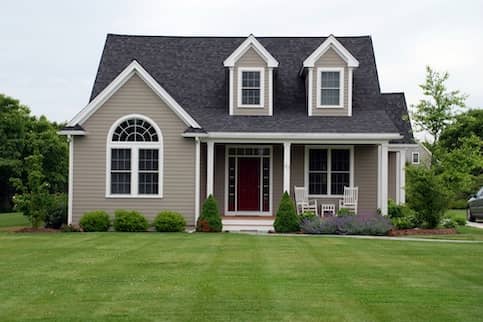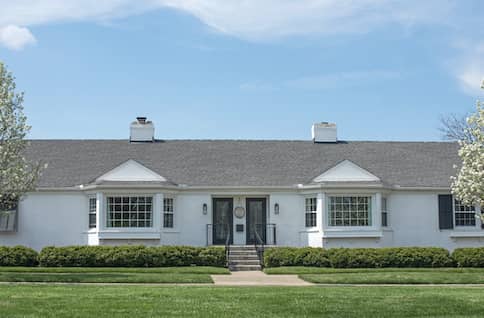Rental properties give investors the opportunity to gain passive income. However, like with any home, certain features of a rental property are going to break down and need maintenance over time. To help compensate for this expense, one of the deductions you can claim is rental property depreciation.
Let’s take a look at rental property depreciation, how it works and how to use this tax benefit. We’ll also take a deep dive into how to calculate your annual depreciation.
How Does Real Estate Depreciation Work?
Rental property depreciation is an income tax deduction real estate investors can use to help offset the earnings they make from their rental property. The amount of income an owner can deduct is determined by the “useful life of the rental property” as decided by the Internal Revenue Service (IRS).
Once the useful time frame of the property is determined, you can use a formula to calculate the amount of value lost due to depreciation each year and claim the deduction on your taxes. While this article will walk you through the basics, you should ask your tax adviser any questions you have on your specific situation.
Reporting Rental Property Depreciation To The IRS
Depreciation of rental property is generally reported on Schedule E of a standard 1040 tax form, although some situations call for using other forms. For example, Form 4562 may be used if you claim depreciation on a property in the year you put it into service as a rental property.
If you have any concerns over which form is right for you, speak with a tax preparer or financial adviser.
Typically, those who rent out their residential property have to report their rental income on their taxes. The exception to this is if the property is used primarily as a home and rented out for 15 or fewer days. You’re not allowed to deduct rental expenses for the property if it’s rented out for this amount of time, either.
In addition to deductions for depreciation, you can take a deduction for items like homeowners insurance and certain property taxes. The IRS has a list of expense items that may be deductible.
Claiming The Depreciation Of A Rental Property
To claim property depreciation as a deduction on your taxes, several conditions have to be satisfied:
- You must own the property. With few exceptions, you’ll need to own the property to claim any depreciation.
- The property must produce income for you. Rental property qualifies since it’s considered income-producing real estate.
- You must be able to determine the useful life of your property. It’s going to be different based on the type of property being depreciated. Everything has a different life cycle, or rate at which it wears down.
- The useful life of the property must be greater than 1 year. Nothing that wears out in less than a year can be depreciated on your taxes.
With regard to real estate, one item that specifically can’t depreciate is property put in service and sold in the same year. This likely won’t come up very often, but if you started renting out your home and then decided being a landlord is no longer for you, or you sold the property for a quick profit in the same year, you can’t claim depreciation.
Useful Life Of Properties
The IRS has standardized what’s considered the useful life of property. For the purposes of real estate, here’s what you should know:
The depreciation life cycle features two different systems: the General Depreciation System (GDS) and the Alternative Depreciation System (ADS). If your property is being used in certain businesses, you may be required to use ADS. Otherwise, you have the option to choose between the two.
Once you select a system, you must stick with it for as long as you claim depreciation on a particular property. ADS generally has longer life cycles than GDS, but the level of depreciation that you can claim each year isn’t as high under ADS.
You can use the IRS’ useful life standards for the following property types:
- Residential rental property: The useful life of residential rental property under GDS is 27.5 years. Under ADS, it’s 30 years (or 40 years if the property was placed in service – rentable – prior to January 1, 2018).
- Nonresidential real property: Under GDS, the life cycle for nonresidential real property is 39 years. ADS has a 40-year time span for this property class.
- Land: If your property doesn’t include any buildings, you won’t be able to claim any depreciation. That’s because the land can’t be depreciated since it doesn’t wear down.
See What You Qualify For
Buy A Home
Discover mortgage options that fit your unique financial needs.

Refinance
Refinance your mortgage to have more money for what matters.
Tap Into Equity
Use your home’s equity and unlock cash to achieve your goals.
How To Calculate Depreciation On A Rental Property
Calculating property depreciation is a three-step process that involves determining your cost basis, dividing by the property’s useful life under your chosen depreciation system and calculating a depreciation schedule.
Please note that this particular example doesn’t include the costs of any potential property improvements, which would also be included (excluding tax credits associated with these improvements). It’s always best to speak with a tax adviser for more insight on your particular situation.
Step 1: Determine Your Cost Basis
Your cost basis (the initial value from which any future depreciation is taken) depends on your property value plus certain qualified closing costs.
If you’re buying the property as an investment property, the property value is likely the purchase price. If the property is being converted to a rental after you’ve been living there a while, your best bet may be to seek a professional real estate appraisal.
When calculating the cost basis of a property, the value of the land isn’t included, so you’ll want to make sure to only include the value of the house for tax purposes.
To the property value, you can add certain qualified closing costs. These include:
- Property taxes: If you agree to pay the real estate taxes for the seller, you can add these to your cost basis, as long as you don’t also deduct them as local taxes paid elsewhere in your tax return.
- Abstract fees: As part of the title work, someone writes up a description of the property. You’ll have to pay for this service when you close on the loan.
- Charges for installing utility services: This expense includes the cost of gas, electric and water hookups.
- Recording fees: A record of the transaction is recorded with your local authorities. You’ll pay a fee for this.
- Transfer taxes: A transfer tax is usually calculated as a percentage of the sales price that local authorities get when a property transfer takes place.
- Legal fees: Some states require that an attorney be at closing. Even if an attorney isn’t required, you might still wish to have one present.
- Surveys: A survey may be necessary to determine property lines. If so, you’ll have to pay for a surveyor to visit and map out the property.
- Title insurance: If you’re getting a mortgage, your lender will require you to secure a lender’s title policy. An owner’s title policy will protect you if anyone comes along with a legitimate interest in your property that wasn’t discovered before you closed.
- Any other amounts owed that you agreed to pay: These could be back interest payments or real estate commissions.
If you buy an investment property for $200,000 and pay $6,000 in eligible closing costs, your total cost basis is $206,000.
Step 2: Divide By The Property’s Useful Life
To calculate the annual amount of depreciation on a property, you’ll divide the cost basis by the property’s useful life.
In our example, let’s use our existing cost basis of $206,000 and divide by the GDS life span of 27.5 years. Your depreciation would be $7,490.91 per year, or 3.6% of the loan amount.
Step 3: Calculate The Depreciation Schedule For Rental Property
In the first year you have the property, you can only claim depreciation for as long as it has been in service. Therefore, if you start renting the property in May, you have to pretend you started renting in the middle of the month.
The IRS has tables that it provides at the end of Publication 946. Use the second chart in appendix A to determine which table will give you the percentage of depreciation to take in the first year. Since we’re using GDS on residential rental property with a mid-month service assumption starting in May, you can take 2.27% depreciation in the first year.
See What You Qualify For
You can get a real, customizable mortgage solution based on your unique financial situation.
Rental Property Depreciation FAQs
Here are a few frequently asked questions related to rental property depreciation.
What’s the rental property depreciation income limit?
Concerning the rental property depreciation income limit, owners will need a gross income limit of $100,000, and they’re able to deduct up to $25,000. Real estate professionals who are rental property owners are allowed to deduct any amount of losses from their non-passive income.
What happens to depreciation when a rental property is sold?
Rental property depreciation can be very beneficial, but it can be a bit tricky when you’re selling the property. Here’s an example to make it a bit easier to understand.
If your cost basis is $200,000 and your total depreciation is $25,000, the IRS will calculate the capital gains based on $175,000. If you end up selling the property for $250,000, the IRS calculates the capital gains tax with a profit of $75,000 instead of $50,000. This is called depreciation recapture.
What happens if I don’t claim depreciation on a rental property?
As a first-time real estate investor, it can be easy to overlook this tax deduction, especially if you do your own taxes. Luckily, you can claim your depreciation benefit after the fact on your recent tax return. By completing a Form 1040X and any other forms or schedules, you can amend your tax return to claim this tax benefit.
The Bottom Line: Rental Property Depreciation Can Be A Huge Tax Advantage
As a real estate investor, you’ll likely be glad that one of the expenses you can deduct is depreciation on your rental property. The depreciation deduction is meant to help offset the ongoing cost of maintenance on a property over time and reduce your taxable income.
For tax advice tailored to your personal situation, consider speaking with an accountant or tax adviser. And, if you want to get started on your real estate investing journey, you can

Victoria Araj
Victoria Araj is a Staff Writer for Rocket Companies who has held roles in mortgage banking, public relations and more in her 15-plus years of experience. She has a bachelor’s degree in journalism with an emphasis in political science from Michigan State University, and a master’s degree in public administration from the University of Michigan.












